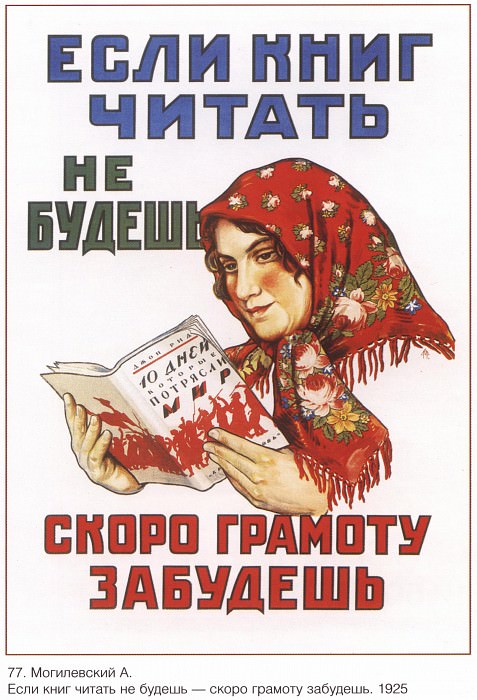If you do not read books, you'll forget the grammar soon. (MAAndreev) Soviet Posters (1917-1941)
Soviet Posters – If you do not read books, you'll forget the grammar soon. (MAAndreev)
Edit attribution
Download full size: 2386×3508 px (3,7 Mb)
Painter: Soviet Posters
Propaganda posters, which in modern times would be more commonly referred to as motivational posters, were very popular in the last century. Each one displayed its own meaning. Entire cycles of posters were created, in which a subject was taken as the basis, for example illiteracy or drunkenness, and the artists created a whole series of different images on this subject, all with a common message. At the beginning of the last century and beyond the country began to fight against illiteracy.
Description of the Soviet poster "If You Don’t Read Books, You’ll Soon Forget Literacy"
Propaganda posters, which in modern times would be more commonly referred to as motivational posters, were very popular in the last century. Each one displayed its own meaning.
Entire cycles of posters were created, in which a subject was taken as the basis, for example illiteracy or drunkenness, and the artists created a whole series of different images on this subject, all with a common message.
At the beginning of the last century and beyond the country began to fight against illiteracy. Therefore, it is not surprising that one of the themes for the new series of posters was reading books.
Artists created a lot of paintings on this topic. All of them urged people to learn, to read, because books are a source of knowledge, which can never be replaced by something else. They were thousands of years ago, will live on.
Education among the population became very important in the last century, and in that century it has stepped forward a great distance. Posters played their part in this, for some of them depicted women, who before that time had been considered more and more destined for the economy than for science. It was no longer fashionable to be illiterate. Another very good one, calling for parental attention, was a poster from the same series, "Rather than scolding children and being, it is better to buy them books.
The poster "If you don’t read books, you will soon forget your literacy" is a very powerful motivator, which is still relevant today. After all, in our age of modern technology and progress, people began to move away more and more from reading the usual paper books, using the electronic format and summary content.
But this approach deprives a person full of imagination, the memory becomes worse. Attention and assiduity can not be brought up on the summary. In our time, the phrase from this poster is very relevant. And such posters would not hurt in our society.
Кому понравилось
Пожалуйста, подождите
На эту операцию может потребоваться несколько секунд.
Информация появится в новом окне,
если открытие новых окон не запрещено в настройках вашего браузера.
You need to login
Для работы с коллекциями – пожалуйста, войдите в аккаунт (open in new window).




















COMMENTS: 1 Ответы
Советское время – золотая эпоха нашей Родины. Как отдельная, непобедимая планета. Во всем порядок.
You cannot comment Why?
The poster features a woman with a kind, knowing expression, dressed in a traditional red headscarf adorned with floral patterns and fringed edges. She is holding open a book, and her gaze is directed towards it with interest. The book itself is titled 10 Days That Shook the World by John Reed, a famous account of the October Revolution. The pages of the book are illustrated with red silhouettes of figures engaged in some form of protest or revolution.
The prominent text at the top of the poster, in large blue and green Cyrillic letters, strongly conveys the message that neglecting to read will lead to a decline in literacy. The bottom text reiterates this warning.
The subtext of the poster is multi-layered. Firstly, its a clear appeal for literacy and education, emphasizing the importance of reading for maintaining intellectual capacity. Secondly, by featuring John Reeds book, 10 Days That Shook the World, it implicitly connects reading and education with understanding and supporting the ongoing revolutionary cause and its historical significance. The imagery of revolution on the books pages further reinforces this connection, suggesting that reading about such pivotal events is crucial for the new Soviet citizen. The woman, depicted in traditional attire but engaged with a political text, could represent the broader populace, urging them to embrace education and political awareness as part of the new societal transformation. The poster aims to inspire a culture of reading and intellectual engagement within the context of the developing Soviet state.